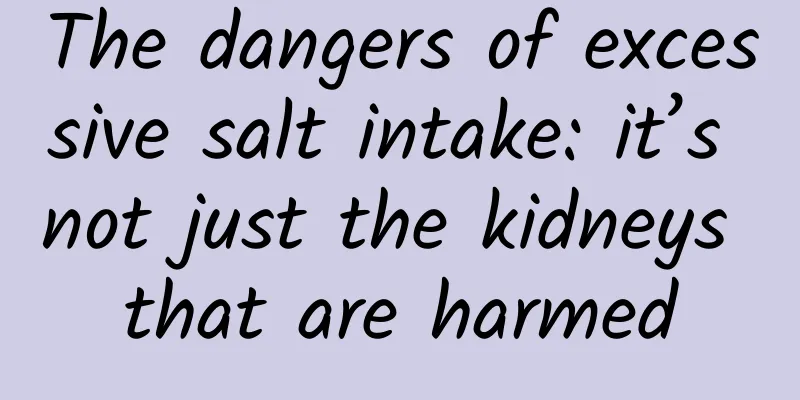The dangers of excessive salt intake: it’s not just the kidneys that are harmed

|
01. Damage to blood vessels: Sodium regulates human body functions. Excessive intake will increase blood pressure, damage vascular endothelial cells, and cause vascular stenosis. 02. Damage to the heart: Excessive salt can cause heart disease, cause water to enter cells, and increase the burden on the heart. 03. Damage to bones: Eating too much salt will cause the kidneys to excrete calcium ions when excreting sodium ions, leading to calcium loss and causing osteoporosis. 04. Damage to the skin: Excessive salt destroys the osmotic pressure, causing the skin to be dehydrated, rough, and increase wrinkles and spots. 05. Damage to the stomach and intestines: High salt and related foods damage the gastric mucosa and are a high-risk factor for gastric cancer. |
<<: How far is Viagra from being able to treat Alzheimer's disease?
>>: [Northern Xinjiang Science] These 10 habits are good for your heart
Recommend
If you have the flu, does drinking electrolyte water help?
During the New Year's Day holiday, the risk o...
What is placental abruption?
Premature placenta means that the placenta is no ...
Can I drink red wine during menstruation?
Girls always have a few days in a month when they...
How long does it usually take to wait for a cesarean section?
Whether it is a caesarean section or a natural bi...
What are the symptoms of fallopian tube adhesions?
Fallopian tube adhesion has become a major proble...
What is the relationship between the Great Lord Qing Yanjing and Muchen? The true identity of Qing Yanjing is revealed
In recent years, TV series adapted from novels ha...
Causes of back and leg pain in women
The symptoms of female low back and leg pain are ...
What to do if you have severe sweating during menopause
In fact, when menopause comes, the physical fitne...
What is the reason for less menstrual flow after wearing the ring?
Some gynecological diseases of female friends are...
At what age do women reach menopause?
There are many women in our lives who are inferti...
What are the symptoms of appendicitis in women?
Appendicitis is a relatively common disease in wo...
What are the symptoms of cerebral infarction in women
Cerebral infarction is a disease that poses a gre...
Why does a pregnant woman have a bad smell in her lower body?
Why do pregnant women have odor in their lower bo...
Seven days after the abortion, the blood is heavy and the belly is big
After choosing medical abortion, female friends w...
Linkedin Bootcamp: How to Market Yourself on the Professional Social Network
LinkeIn is the dark horse of social networks. We a...









